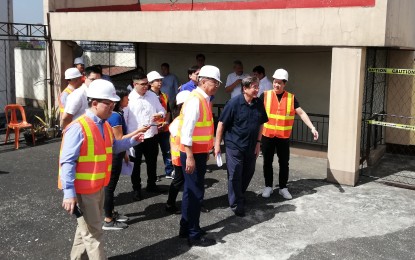
MANILA – An official of DITO Telecommunity (DITO) on Wednesday clarified that its technical rollout in July and its timeline will be completed on schedule, with the firm working to mitigate the effects of the Covid-19 outbreak in China on its sourcing of necessary materials.
In an interview in Quezon City, DITO chief administrative officer Adel Tamano said while the company may cite “force majeure” due to the outbreak in China, the company will instead work to mitigate its effects.
“We understand the public wants the service today. And so, we’re taking all remedial measures that we can so that we will not let this impact and delay our rollout,” Tamano said.
Force majeure, he said, could be used by the company as a legal basis for a delay or to ask for a grace period—a measure that the company will avoid “unless we have exhausted all possible alternatives.”
DITO chief technology officer Rodolfo “Boy” Santiago said Hubei province, the epicenter of the Covid-19 epidemic, was supposed to provide materials such as steel and fiber cables for the company.
Their vendors, however, were still “confident” on supplying their needed materials.
“They [vendors] would request their subsidiaries doing the rollout in other countries, to prioritize supplying the Philippines so it will not be affected by the slowdown of manufacturing in China,” Santiago said.
He cited an instance where custom-made fiber cables bearing the DITO brand—supposed to be sourced from China—will instead be replaced with unbranded cables sourced outside Covid-19-affected areas.
“Hanap na lang muna kami ng iba na kahit walang tatak, saka na lang namin ilagay yung tatak later. So yun yung very specific mitigating measure na ginagawa namin ngayon (We’ll look for others even without our brand, we’ll just put up the brand later. So that’s an example of a specific mitigating measure we’re doing now),” Santiago said.
While the company’s position during the outbreak was “strong,” Tamano said DITO will continue to monitor the situation and address any issues that could lead to a delay.
“It also makes better business sense for us to roll out within the proper time. And that’s why we are very cautious for even considering a delay,” Tamano said.
Meanwhile, Santiago said by July, DITO is set to deliver a network that would cover 37 percent of the country’s population and capable of providing minimum national average speeds of 27 Megabits per second (mbps).
The rollout would not be open to the public and would merely test the capability of DITO’s infrastructure.
To ensure DITO’s compliance with the required specifications, Tamano said a third-party will serve as an auditor on behalf of the National Telecommunications Commission (NTC).
“[On] July 18, 2020, that’s when we have our audit. So, there is an auditor that will be assisting the NTC to make sure that we comply. To make it even simpler, it’s really so that we’re kept honest,” Tamano said.
He added that the company is targeting to cover more than 37 percent of the country’s population by July—with its towers to be installed in the country’s largest metropolis such as Metro Manila, Metro Cebu, Metro Davao, and other highly-urbanized cities.
To date, Santiago said the company has almost 700 cell towers “in several different stages of construction,” with the company set to have at least 1,600 towers by July.
Earlier, Department of Information and Communications Technology (DICT) Secretary Gregorio “Gringo” Honasan II said DITO is required to achieve different goals in the first several years of its rollout or else forfeit its “performance bonds.”
If DITO fails its audit in July, Honasan said the company is set to lose PHP25.7 billion to the government—10 percent of the company’s 5-year cumulative capital expenditure which total to almost PHP258 billion—aside from the possibility of losing its certificate of public convenience issued by the government and its status as the country’s third telco.
“Sa mga susunod na taon, kapag hindi tumupad ang (In the coming years, if commitments were broken by) DITO, they will have to pay a penalty of PHP10.7 billion for the second year, PHP8 billion for the third year, at PHP5.3 billion for the fourth year,” Honasan said.
By DITO’s third year, he said that the company is required to cover 70.1 percent of the population and have minimum national average speeds of 55 mbps, and by the fourth year, 80 percent of the population.